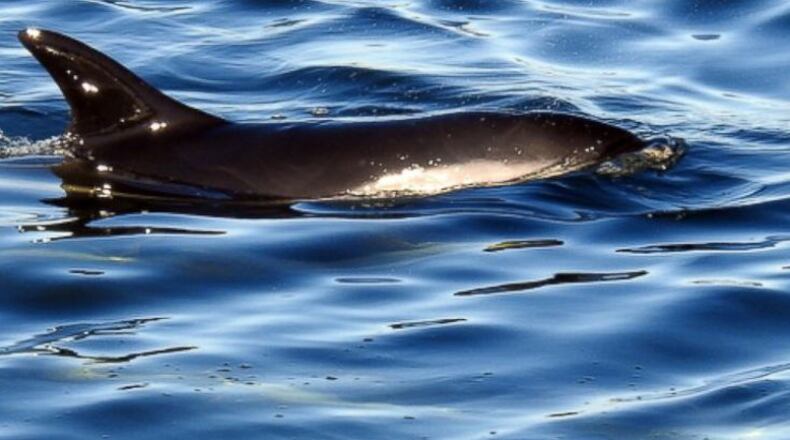A francophone fishing community in eastern Canada is becoming increasingly concerned for a pod of dolphins that have been trapped in shallow water for nearly a week.
The dolphins have been stuck in a harbor in the New Brunwsick town of Lamèque, according to the Marine Animal Response Society.
"The stress could kill them, push them ashore," local fisherman Pierre Larek told ABC News partner, CTV News, on Monday.
Larek, who has been checking on the dolphins daily, added that the marine mammals continually "echo-locate the sides and the bridge and the pillars of the bridge" -- essentially swimming in circles.
The dolphins likely entered the harbor during high tides in the area last week, according to Canada's Department of Fisheries and Oceans (DFO).
A pod of dolphins was discovered trapped in a bay off the city of Lameque in New Brunswick, Canada, on Sept. 28, 2016.
"Since then, tides have reduced and now the water level is too low for them to leave the harbor," the DFO told ABC News in a statement today. "Fishery officers attempted to redirect the dolphins to open water last Thursday but the marine mammals rerouted back to shore."
To get to the open ocean, the pod has to swim more than a mile in shallow water, which is something "they are usually not comfortable doing," according to Andrew Reid, a response coordinator with the Marine Animal Response Society, a group working with the DFO to rescue the dolphins.
A pod of dolphins was discovered trapped in a bay off the city of Lameque in New Brunswick, Canada, on Sept. 28, 2016.
Though there were originally seven dolphins in the pod -- five adults and two babies -- one was found dead on Friday morning, Reid told ABC News today.
Since then, officials have been talking to various experts to determine the best method to save the dolphins, Reid said. He explained that there were not many options that "wouldn't be too stressful on the animals."
The Marine Animal Response Society is currently waiting to get acoustic pingers that could help herd the animals back to the open ocean, according to Reid.
Meanwhile, the DFO said it wants the public to know that "it is very important not to approach the dolphins" as it "could cause them further stress."
"Under the Marine Mammal Regulations of the Fisheries Act, it is illegal to disturb a marine mammal," the DFO said. "Anyone disturbing a marine mammal could be subject to arrest and prosecution. Boats should not come within 400 meters of marine mammals."
ABC News
Keep Reading
The Latest
Featured

